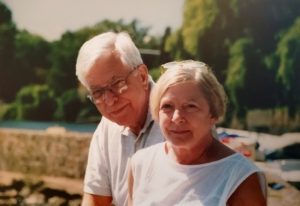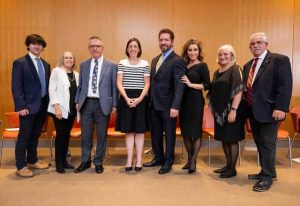Johns Hopkins UniversityEst. 1876
America’s First Research University
Richard “Dick” Johnson, MD, arrived to the Johns Hopkins University School of Medicine as the Dwight D. Eisenhower Professor of Neurology in 1969. Today the legacy of the late influential and internationally renowned neurologist carries on in an endowed professorship in his and his first wife’s names.

School of Medicine faculty member Ellen Mowry, MD, MCR, was installed as the Richard T. and Frances W. Johnson Professor of Neurology last fall. She also serves as chief medical officer for inHealth and co-director of the Johns Hopkins Multiple Sclerosis Precision Medicine Center of Excellence. She joined the faculty at Johns Hopkins in 2011.
“We have such an incredibly strong, collaborative group of faculty working on multiple sclerosis (MS) and related disorders, all of whom are so dedicated and are just as deserving of such an award,” Mowry says. “This honor represents a culmination of not only my own hard work and commitment, but also the dedication of my mentors, colleagues, family, and patients, to my growth and development and to ending MS. As the recipient of the Johnson Professorship, I hope to have as large an impact on more junior colleagues as my mentors had on me — and as the Johnsons had on their protégés.”

Richard and Frances Johnson, known affectionally as Dick and Fran, were married for 54 years. Fran, who died in 2008, was a gifted teacher and writer who worked for many years in the Johns Hopkins School of Medicine’s Department of Student Affairs. Dick was one of the founding directors of the Johns Hopkins Department of Neurology, recruited by Vernon Mountcastle, the legendary founder of neuroscience, who invited Johnson to Hopkins to establish a new department with Guy McKhann, MD.
Along with Daniel Drachman, MD, these four physician scientists built the Department of Neurology and its divisions, cementing Johns Hopkins as a leader in neurology and at the forefront of many advancements that define the field today. Johnson in particular is credited with inventing the field of neurovirology — the study of viruses that infect the nervous system.

The Richard T. and Frances W. Johnson Professorship was established with leadership support from the Johnsons’ children and their respective spouses and partners, along with other family members. Many other family, friends, and colleagues made contributions as well.
“We wanted to establish the professorship in my parents’ names to honor their legacy and their long-term relationship with Johns Hopkins University. Both our parents held Hopkins in very high regard and our entire family has been part of the Hopkins family for decades,” Matthew Johnson, their son, says. “We hope that this professorship will carry on the tradition of our father’s research in neurovirology and recognizes those clinical researchers who embody our parents’ love of exploration.”
Dick Johnson died in 2015, and Mowry continues to follow his patients and carry on his important work. A dedicated educator, committed to mentoring and training the next generation of physician-scientists, Mowry established the Clinical Research Methodology for Inspired Neurology Residents, a monthly lecture series for Johns Hopkins neurology residents, and serves as the co-director of the neuroimmunology clinical research fellowship.
“The professorship provides the opportunity to take some academic risks — to fund an initial project, for example, to evaluate some promising but untested data that might open up a whole new avenue of thinking, or to hire a promising junior investigator who may bring new energy to the field,” Mowry says. “Many of our larger areas of research began with such ‘boosts.’ The Johnson Professorship will enable these boosts on a year-by-year basis, which makes it incredibly impactful.”
An earlier version of this story appeared on the Johns Hopkins Medicine website.
Topics: Faculty and Staff, Friends of Johns Hopkins Medicine, Johns Hopkins Medicine, Neurology, Fuel Discovery